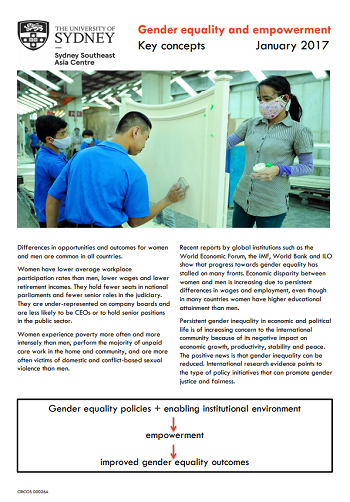Gender equality and empowerment – key concepts
Summary
This factsheet tackles the critical role of gender equality and empowerment in enhancing women’s participation in corporate governance and leadership.
It addresses the challenges and strategies for achieving gender equality and women’s empowerment in various institutional environments. It highlights the persistent disparities in workplace participation rates, wages, and leadership positions between women and men globally. The document emphasises the role of enabling institutional environments in facilitating gender equality and outlines specific policy measures such as paid maternity leave, flexible work arrangements, and gender quotas that can support women’s retention and advancement in the workforce.
It calls for a comprehensive approach that integrates public policy, business practices, and cultural shifts to effectively promote gender justice and fairness.
This research is published by the Sydney Southeast Asia Centre at the University of Sydney, commissioned by Investing in Women.
Highlights
- Women globally face lower workplace participation rates, lower wages, and are underrepresented in leadership roles, indicating widespread gender inequality.
- An enabling institutional environment, characterised by supportive policies and cultural attitudes, is crucial for achieving gender equality.
- Effective gender equality policies include paid maternity and paternity leave, job guarantees upon return to work, and flexible working conditions.
- Integrative approaches that combine policy, cultural change and business practice are necessary to create lasting gender equality and empower women.


